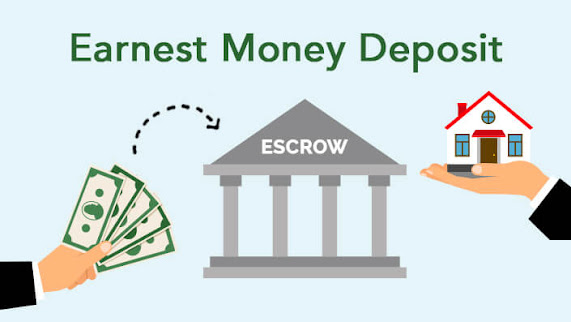What Is Meant By Earnest Money In The Real Estate
Sector?
The term earnest money is referred to the amount of money,
which is paid by the buyer to the seller, at the time of making a deal of a
home. The earnest money represents the goodwill of the buyer to buy the
property. It has a variety of other names as well such as escrow deposit, the money
of goodwill, or deposit on a property.
Several people are unaware of the term of earnest money. For
this reason, this blog is specially written to provide all the major and minor
details related to earnest
money in the real estate sector.
What Is The Significance Of Earnest Money?
Earnest money in the
real estate sector holds
great importance as it is a contract indicating the level of interest of the buyer.
Moreover, all the real estate properties form the contract of earnest money. The
chance of fraud is decreased because the earnest money acts as a solid agreement.
Another significance associated with the earnest money provides
the buyer some extra time for financing and performs the search for title, inspections
before closing the deal, and appraisal of the property.
Points To Protect Your Earnest Money
Certain points are there to consider for the safeguard of
your earnest money in the real estate sector.
We have made a detailed list of those important considerations have a look at
those:
- The agreement must provide the possibility for funding and insurance. The amount will have a penalty if during the inspection, funding is not being done or some other defect is found.
- Everything from reading, comprehending, and complying should be done according to the contract. It means that if the contract mentions a certain date for the home inspection, then the buyer must meet that deadline. Otherwise, it will result in the loss of property.
- The
amount of deposit for the earnest money, must be handled appropriately. For
example, the amount is not directly paid to the seller, there is a third party
such as real estate brokerages, company, a law firm, or escrow.
How Much Amount Should I Save For
Earnest Money?
There is no fixed amount for earnest money in the real estate sector.
The amount is negotiated between the buyer and the seller. Usually, the earnest
money ranges from 1-3% of the total purchase price of the property. This amount
can increase if desired by the seller.
The seller can demand an increased amount of earnest money in
some cases. For example, the buyer demands for a significantly long period until
the closing of the deal is done. Another reason can be that a seller might have
other offers for the selling of a home, or the buyer offers a very minimum
amount.
What Circumstances Can Cause A Buyer
To Lose Earnest Money?
In some particular cases, the buyers
lose their earnest money, which automatically helps the seller secure it. This
can happen in conditions such as:
- If
the buyer fails to meet a deadline for inspection of a home, which was
mentioned earlier in the contract.
- If
the contingencies are insisted prematurely.
- Voiding
a contract in a non-refundable way.
- If
a buyer is caught up in making a bid in every other offer of buying a home.
- In
case if a buyer decides that the home is not appropriate after a certain period
of the contract, then he will end up losing the amount of earnest money.
Is There Any Return Policy For The
Earnest Money?
The return policy for earnest money
can only be availed if something goes out of the agreed conditions of the
contract. To take an example, if the appraisal price of the house is less than
the sale price or a flaw is detected in the house up for sale. In such conditions,
earnest money can be returned through a certain policy.
In some cases, the earnest money is
non-refundable. If a flaw is detected but was not pre-defined as a part of the
agreement. Moreover, if a buyer cancels the purchase after a significant period
of the agreement, in this case also the earnest money is not returned.
To sum up the whole discussion, earnest money in the real estate
sector carries both, advantages as well as disadvantages. If you are planning
to opt for the option of earnest money, then do check the circumstances. If the
situation is providing you benefit, then make a contract with suitable points
in it. In this way, you will be saved from a lot of hassle which usually people
face during the process of buying a home. We hope that this blog helped you a
lot, as far as earnest money is concerned.



Comments
Post a Comment